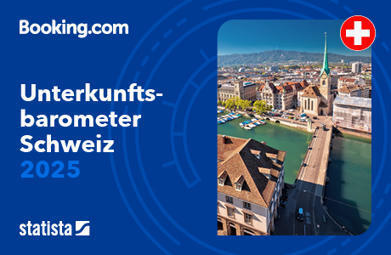 Your new post is loading...
 Your new post is loading...

|
Scooped by
Roland Schegg
July 12, 7:13 AM
|
"How hotels across Europe are exploring artificial intelligence—where it’s working, what’s holding them back, and why the future depends on thoughtful integration
European hoteliers are cautiously optimistic about AI, recognizing its potential to enhance efficiency and guest experience. Yet, actual adoption remains limited, as many grapple with knowledge gaps, cost concerns, and integration challenges. A recent survey across six countries reveals that the industry is entering a phase of cautious experimentation, with a long road ahead to full strategic integration."

|
Scooped by
Roland Schegg
July 12, 6:35 AM
|
While European hotels are integrating artificial intelligence (AI), adoption is still fragmented.
According to a recent survey conducted by the University of Applied Sciences of Western Switzerland Valais (HES-SO Valais-Wallis), the interest is there, with hoteliers reporting AI can be useful for reservations (68%), marketing (62%), customer relationship management (51%) and data analysis (49%). However, only 41% of hotels said they're actually using AI, and 43% said they're not using it at all.
The survey, which is part of national research project Resilient Tourism, included responses from over 1,500 hotels in Austria, Germany, France, Greece, Italy and Switzerland.

|
Scooped by
Roland Schegg
July 11, 12:58 AM
|
"The G7/OECD policy paper on Artificial Intelligence and tourism highlights the potential to harness AI as a tool to promote innovation and the sustainable development of tourism. It discusses the opportunities and risks AI brings, and what this means for tourists, businesses, destinations and governments. Key policy issues are identified, including the need to: i) put in place robust data and consumer protection measures as AI is used to create personalised tourist experiences; ii) monitor the impact on tourism jobs and protect and prepare workers, as AI used to improve operational efficiency; and iii) support tourism businesses, and SMEs in particular, to keep pace with rapid AI developments and comply with evolving legal and regulatory frameworks, while fostering a dynamic environment for innovation."

|
Scooped by
Roland Schegg
July 10, 9:20 AM
|
Leisure travelers worldwide are increasingly turning to social media and artificial intelligence (AI)-powered sites, with use particularly prevalent in emerging markets, according to research from global consulting firm BCG.
The study included responses from approximately 5,000 travelers across Australia, China, India, Indonesia, Germany, Mexico, Nigeria, Saudi Arabia, the United Kingdom, the United States and Vietnam—all countries with populations that travel frequently or are expected to do so in the future. The company also analyzed travel patterns from 2014 through 2024 across 68 countries and developed forecast data through 2040.
The report highlighted opportunities in the expanding leisure travel sector, stressing the need for those in the industry to embrace AI. According to survey findings, leisure travel is expected to triple—from $5 trillion to $15 trillion—by 2040, with more of the "next wave" of travelers coming from emerging markets such as China, India, Saudi Arabia, and Vietnam, as opposed to more traditional destinations like Germany, the U.K. and the U.S.

|
Scooped by
Roland Schegg
July 10, 8:54 AM
|
WhatsApp is present in nearly 3 billion phones, making it one of the most used messaging applications across industries and areas, including hospitality and hotel guest communication.
But what makes it the right choice besides the amount of users? How to create a WhatsApp hotel communication strategy? And what role does it play in comparison to emails and SMS in hospitality?
These are all valid questions we will explore in this article.

|
Scooped by
Roland Schegg
July 8, 3:48 AM
|
"Google has proposed a revised search layout to comply with the EU’s Digital Markets Act (DMA), but new analysis reveals a potential bias: the new design tends to privilege large travel intermediaries like Booking.com over individual hotel properties. The solution, while technically fulfilling DMA requirements, may shift the balance—favoring aggregator platforms instead of empowering direct sellers like independent hotels.
Key takeaways
Aggregator-first visibility: Google’s “Option B” adds two stacked boxes under its search results: a vertical search service (VSS) module and, below it, a free-links box to suppliers. However, aggregators such as Booking.com dominate the supplier box—boosting their exposure over direct hotel links.
Unintended bias: Despite being designed to level the playing field, the supplier box actually highlights large intermediaries with better SEO resources and bidding power, marginalizing individual hotel websites and smaller platforms.
Regulatory optics: Google’s strategy technically meets the DMA’s anti-self-preferencing rule, but subtly retains its advantage by steering users toward dominant aggregators. This clever workaround could satisfy regulators without truly empowering hotels.
Rival concerns: Competing travel services, especially smaller operators and independent hoteliers, are concerned this solution will entrench Booking.com’s position.
User experience vs. fairness tension: Google argues its solution preserves user experience. However, analysts notes that meaningful compliance should not just be cosmetic—it should redistribute visibility in an equitable way, not simply repackage it.

|
Scooped by
Roland Schegg
July 7, 9:46 AM
|
With the rise of artificial intelligence (AI), search engine optimization—or at least SEO as we know it—has been effectively kicked out of the party. And it's a “reality” that the travel sector is being forced to confront.
Mario Gavira, vice president of growth and brand for Kiwi.com, who has been vocal about the future as it relates to AI and agentic AI, said the industry has to adapt.
“Our content strategy, linking strategy has to change to adapt to the new reality,” Gavira said. “But that's the first step. Now we have to test—will these AI agents really become a new acquisition channel? Will it be only search? Will it be end-to-end transactions? Will people be willing to allow the agent to actually finish a transaction on behalf of the customer?”
Right now, it’s all unknown. The key, according to Gavira, is preparing for all possible shifts.
“The organic part of the traffic will probably shrink massively,” Gavira said. “However ... the AI answer engines will still, obviously, mention certain providers or certain brands whenever a customer does a prompt for a specific need, right?”

|
Scooped by
Roland Schegg
July 7, 9:30 AM
|
Since Google’s launch in 1998, online search has been built on keywords, rankings, and backlinks. Generative AI is rewriting that playbook with personalized, real-time responses in natural language.
Generative AI (genAI) refers to AI systems that can create new content, including text, images, audio, and video, by identifying patterns in large data sets. A key category of genAI is large language models (LLMs), which are designed to understand and generate human language. Users interact with these models through chat-style interfaces.
“The way brands are discovered online is being rewritten. Traditional SEO is giving way to a new reality: visibility in AI-generated answers is now an additional frontline,” says Mathias Ptacek, Founder of Rankscale, a tool that tracks AI search engine visibility for brands. “Our data shows that over 40% of brand impressions in engines like ChatGPT and Perplexity come from third-party citations—forums, blogs, news, and expert reviews. Brands with more unique citations are not only more likely to be listed by AI, but also rank higher in responses. It’s no longer about just driving website visits; it’s about being the trusted source AI highlights at the moment of users’ highest intent.”

|
Scooped by
Roland Schegg
July 7, 3:47 AM
|
"The 2025 Swiss Accommodation Barometer is a breakaway report of the 2025 European Accommodation Barometer conducted by Statista in collaboration with Booking.com. The study tracks the development of the Swiss travel accommodation sector captures the opinions of hoteliers on top topics relevant to their industry."

|
Scooped by
Roland Schegg
July 4, 4:50 AM
|
Comme souvent avec OpenAI, l’annonce n’est pas passée inaperçue. En avril, la startup californienne lançait Shopping, une extension de sa fonctionnalité de recherche web conçue pour répondre à la hausse des requêtes liées à la recherche ou à l’achat de produit, un « sujet récurrent » sur ChatGPT, selon ses dires.
Le principe ? Afficher, sous forme de carrousels, des produits sélectionnés de manière organique, avec un prix, une description et des avis, dès lors que la requête affiche une intention d’achat. Une manière d’offrir à son agent conversationnel, qui compte désormais 800 millions d’utilisateurs hebdomadaires, un nouveau rôle : celui d’un personal shopper, avec qui l’on peut véritablement dialoguer pour affiner son choix.

|
Scooped by
Roland Schegg
July 4, 1:35 AM
|
By 2026, traditional search engine volume will drop 25%, with search marketing losing market share to AI chatbots and other virtual agents, according to Gartner, Inc.
“Organic and paid search are vital channels for tech marketers seeking to reach awareness and demand generation goals,” said Alan Antin, Vice President Analyst at Gartner. “Generative AI (GenAI) solutions are becoming substitute answer engines, replacing user queries that previously may have been executed in traditional search engines. This will force companies to rethink their marketing channels strategy as GenAI becomes more embedded across all aspects of the enterprise.”

|
Scooped by
Roland Schegg
July 3, 9:41 AM
|
With the rise of artificial intelligence (AI), search engine optimization—or at least SEO as we know it—has been effectively kicked out of the party. And it's a “reality” that the travel sector is being forced to confront.
Mario Gavira, vice president of growth and brand for Kiwi.com, who has been vocal about the future as it relates to AI and agentic AI, said the industry has to adapt.
“Our content strategy, linking strategy has to change to adapt to the new reality,” Gavira said. “But that's the first step. Now we have to test—will these AI agents really become a new acquisition channel? Will it be only search? Will it be end-to-end transactions? Will people be willing to allow the agent to actually finish a transaction on behalf of the customer?”

|
Scooped by
Roland Schegg
July 2, 8:05 AM
|
Expedia’s vision for AI with purpose Chief Product Officer Shilpa Ranganathan champions intuitive, empathetic design to turn complex journeys into seamless experiences Jul 2, 2025 At Phocuswright Europe, Shilpa Ranganathan, Chief Product Officer at Expedia Group, delivered a compelling vision for...
|

|
Scooped by
Roland Schegg
July 12, 7:03 AM
|
"L’intelligence artificielle transforme en profondeur les métiers du marketing digital. Automatisation, prédiction, personnalisation : chaque levier est impacté. De la création de contenu à la gestion de campagnes, en passant par le SEO et le CRM, l’IA redéfinit les règles du jeu. Dans cet article, les équipes de datashake ont regroupé 14 conseils concrets, répartis en 4 piliers clés de l’acquisition digitale : SEA/SMA, SEO, CRM et créa."

|
Scooped by
Roland Schegg
July 12, 6:23 AM
|
According to a recent survey conducted by the University of Applied Sciences of Western Switzerland Valais (HES-SO Valais-Wallis), the interest is there, with hoteliers reporting AI can be useful for reservations (68%), marketing (62%), customer relationship management (51%) and data analysis (49%). However, only 41% of hotels said they're actually using AI, and 43% said they're not using it at all.

|
Scooped by
Roland Schegg
July 10, 10:50 AM
|
"PILOTPROJEKT
Ferienprofil Graubünden personalisiert Reiseideen
Die Marketingorganisation Graubünden Ferien lanciert ein Pilotvorhaben zur digitalen Personalisierung touristischer Angebote. Ziel ist eine einfachere und inspirierendere Ferienplanung.
Graubünden Ferien lanciert das Ferienprofil Graubünden.
Bild: zvg
Das Ferienprofil Graubünden ist eine neue und innovative Website-Funktion auf dem Bündner Tourismusportal graubuenden.ch. Sie ermöglicht es, Reisepräferenzen und Interessen der User innert Kürze zu erfassen und sicher in einem schweizweiten Gäste-Account zu speichern. Gestützt auf die Angaben lassen sich gezielte Empfehlungen für Ferienerlebnisse in Graubünden ableiten, die auf die individuellen Bedürfnisse und Wünsche der Gäste abgestimmt sind. Die Daten werden datenschutzkonform erfasst und verarbeitet."

|
Scooped by
Roland Schegg
July 10, 8:55 AM
|
If you talk to any hotel executive today, the topic of artificial intelligence (AI) is almost guaranteed to come up. From predictive analytics to personalised guest messaging, AI is widely regarded as the next frontier in hospitality innovation. But how far along are we really? And what is the difference between aspiration and implementation?
To find out, we recently surveyed over 1,000 hotels in Austria, France, Germany, Italy and Switzerland. Results were insightful, not only because of the ways in which AI is already being used in hotels, but also because of the areas in which it is struggling to take root.

|
Scooped by
Roland Schegg
July 9, 10:07 AM
|
API-first property management system (PMS) Apaleo aims to help hoteliers scale business. And according to founder and CEO Uli Pillau, the platform give developers and startups, as well as established players, the opportunity to innovate.
“When you look at us, we are the only not all-in-one PMS in the market—we are a true platform, so our innovation comes really from all of the apps and the modules and components, which are being developed by third parties on top of our Apaleo PMS platform,” Pillau said in a recent interview with PhocusWire news editor Abby Crotty.
Founded in 2017, Apaleo describes itself on its website as “the open platform for modern hospitality,” with its latest initiative, Agent Hub, launched earlier this year. The marketplace of artificial intelligence (AI) agents is intended to help hoteliers and tech developers share, adopt, discover and build solutions based on AI.

|
Scooped by
Roland Schegg
July 7, 10:06 AM
|
POURQUOI LES AVIS GOOGLE SONT (VRAIMENT) IMPORTANTS?
Les avis clients, ce n’est pas juste une « cerise sur le sundae ». C’est devenu un outil marketing à part entière. Et aujourd’hui, ce n’est plus toi qui contrôles le récit autour de ton entreprise — ce sont tes clients.
Avant d’acheter ou de réserver, on lit. On compare. On scrolle comme sur Booking, Facebook Marketplace ou Amazon. Une fiche Google vide ou négligée? Merci, bonsoir!

|
Scooped by
Roland Schegg
July 7, 9:44 AM
|
Travel in the United Kingdom, France and Germany continues to rise. Booking decisions are often influenced by factors revolving around value and price, while media use has increased when planning and searching for trip ideas. When it comes to research before booking a trip, new Phocuswright research report Europe Consumer Travel Report 2025 has uncovered four key insights that travel companies should know about:
Search engines and online travel agency sites maintain their lead positions as main research resources. The reviews found on general search engines are leveraged the most.
Interestingly, artificial intelligence (AI) results in search are at parity with paid search results, likely due to their placement at the top of the page.
Generative AI is gaining momentum but still has a long way to go before being a top resource.
Recommendations from friends and family are still used more than any other single resource.

|
Scooped by
Roland Schegg
July 7, 9:28 AM
|
While there were many buzzwords at HITEC 2025 in Indianapolis last month, artificial intelligence (AI) was one that couldn’t be ignored.
Hospitality technology companies were quick to discuss the ways they’re integrating AI into their products and platforms, but when it comes to the willingness of hotels to adopt and invest in emerging AI capabilities, there was less to be said.
“Obviously, that’s high on everyone’s mind right now—and the thing is that everyone talks about AI, but very few people understand what’s behind it or what the value is,” said Klaus Kohlmayr, chief evangelist and head of strategy for IDeaS.

|
Scooped by
Roland Schegg
July 4, 4:51 AM
|
Cela ne fait désormais aucun doute : ChatGPT est devenu le premier concurrent sérieux de Google dans le domaine de la recherche en ligne depuis des décennies. Son implantation se traduit par de nouvelles habitudes pour les internautes : les recherches sont plus naturelles et les réponses sont générées sans même avoir besoin de cliquer. Si la domination de Google n’est pas encore remise en cause, la firme a bien dû s’adapter à cette nouvelle donne, notamment par le lancement d’AI Overviews et de l’AI Mode.
Naturellement, ces récents bouleversements tendent à inquiéter les éditeurs, qui craignent une chute de trafic. Si Google tente de se montrer rassurant, en promettant de « continuer de se concentrer sur l’envoi d’un trafic de qualité aux éditeurs et aux créateurs », le géant du web peine à convaincre les producteurs de contenu en ligne, dont certains perçoivent déjà les effets du nouveau modèle.
Qu’en est-il vraiment ? Similarweb s’est penché sur cette question, dans sa dernière étude sobrement intitulée The Impact of Generative AI: Publishers, qui analyse le marché étasunien.

|
Scooped by
Roland Schegg
July 4, 3:10 AM
|
For years, hoteliers have focused on driving direct bookings, but industry experts now emphasize the strategic importance of optimizing presence on online travel agency (OTA) platforms. At the 2025 HSMAI Commercial Strategic Conference, leaders from Crescent Hotels, Expedia Group, and Booking.com highlighted how OTAs offer not just distribution, but data-driven insights, technology tools, and strategic partnerships that can significantly enhance hotel performance and guest engagement in the age of AI.

|
Scooped by
Roland Schegg
July 4, 1:34 AM
|
The digital marketing landscape for hotels is undergoing a significant transformation, driven by the surging adoption of AI-enabled search and usage of intelligent AI agents like ChatGPT. This transformation necessitates a new approach to maintain your hotel's online visibility.
Introducing yet another acronym, because we don't have enough in hospitality already!;
GEO or Generative Engine Optimisation.
With over 20 years of hotel SEO mastery and GEO front-of-mind, our websites are ready for a new era of hotel search. Are you?

|
Scooped by
Roland Schegg
July 3, 1:11 AM
|
"Un rapport dénonce les promesses trompeuses des géants de la tech sur leurs émissions de gaz à effet de serre, incapables de tenir leurs objectifs face à l'explosion de la demande énergétique.
Selon les ONG, les calculs des entreprises tech sur leurs émissions sont obsolètes et ne comptabilisent pas correctement les sous-traitants, tandis que la demande en électricité des centres de données devrait doubler d'ici 2030.
Google affirme avoir réduit les émissions de ses centres de données de 12% en 2024 malgré une forte croissance, mais les ONG réclament plus de transparence et de nuance sur les défis climatiques."
|






 Your new post is loading...
Your new post is loading...























